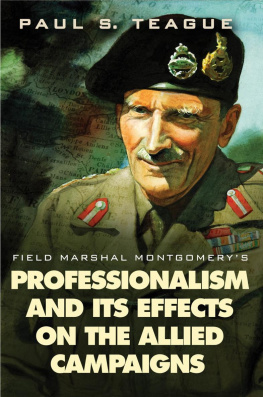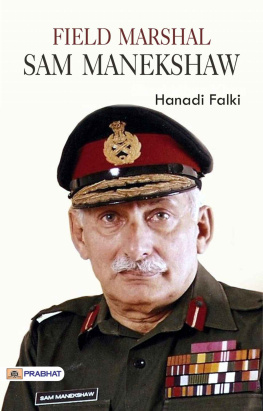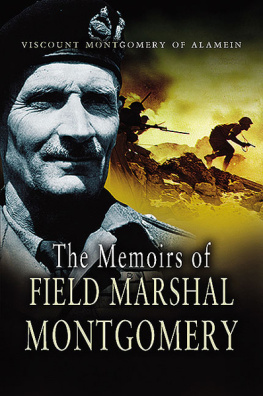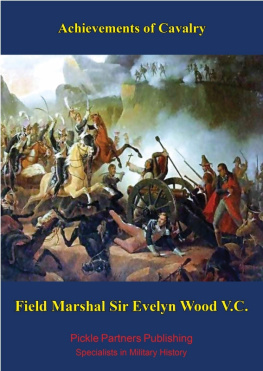FIELD MARSHAL MONTGOMERYS
PROFESSIONALISM
AND ITS EFFECTS ON
ALLIED CAMPAIGNS
Paul S. Teague, Major, United States Army Retired
Field Marshal Montgomerys
Professionalism and Its Effects
on Allied Campaigns
by Paul S. Teague, Major, United States Army Retired
Copyright 2018 Paul S. Teague
ISBN 978-1-63393-711-6
All rights reserved. No part of this publication may be reproduced, stored in a retrieval system, or transmitted in any form or by any meanselectronic, mechanical, photocopy, recording, or any otherexcept for brief quotations in printed reviews, without the prior written permission of the author.
Cover image found on Wiki Commons. This work is greated by the United Kingdom Government is in the public domain.
Published by
210 60th Street
Virginia Beach, VA 23451
800-435-4811
www.koehlerbooks.com
Praise for
Field Marshal Montgomerys Professionalism and Its Effects on Allied Campaigns
Generals are notorious for exaggerating battlefield success and for fudging the facts when the facts are unflattering. Paul Teague demonstrates that Field Marshal Sir Bernard Montgomery, arguably one of World War IIs most competent and, effective allied commanders, was no exception to this rule. Teague tells a revealing story that will concentrate the minds of students and practitioners of the military art on the pitfalls of high command in war.
DOUGLAS MACGREGOR, Colonel (ret) U.S. Army. Author of Margin of Victory: Five Battles that Changed the Face of Modern War
DEDICATION
To my beloved wife, Kabaka Mutesa Teague, Master Sergeant, United States Army Reserve (Retired), the mother of my three children, Kendra, Isabelle, and Paul. She is the reason I am able to Charlie Mike.
AUTHORS NOTE
Historians seem to have divided themselves into pro-Montgomery or anti-Montgomery cliques. The pro-Montgomery historians find no fault in him; the anti-Montgomery historians find no virtues. Not wishing to be included in either group, I have made a concerted effort to be fair in my analysis of the historical evidence concerning Montgomery during the Second World War. Though most of my conclusions may seem harsh, I am confident that I did give credit where credit is due. Montgomerys generalship at Alam Haifa and Second Alamein was dynamic and decisive. It is safe to say no general, British or American, would have done better. His modifications to the Overlord plan ensured success on that crucial day, June 6, 1944. Without Montgomery, D-Day could have been a disastrous defeat; instead, it was a magnificent victory.
FOREWORD
This excellent book focuses on the strengths and weaknesses of a legendary military leader from World War II, Field Marshal Bernard Law Montgomery. All great leaders, military or civilian, are first and foremost individuals with unique personalities. In this volume, Paul Teague excels in sharing with the reader an analysis of Field Marshal Montgomerys many strengths, his notable weaknesses, and how those strengths and weaknesses affected Allied campaigns during the conflict. After a discussion of Bernard Law Montgomerys formative early years and how they influenced both his strengths and his weaknesses, Paul Teague recounts Montgomerys tactical and operational activities in North Africa, Sicily, Italy, the invasion of France at Normandy, and the Allied march toward Berlin.
Any successful study of military leadership includes many perspectives. As you read through this work, be alert to how Paul addresses Field Marshal Montgomerys interactions with both his military and his civilian counterparts and superiors (civil-military relations), and how Montgomery attempted to use and manipulate the media to his and the Allies advantage (military-media relations). You will learn about how Montgomery handled dissent and ethical issues, both his own and those of others. One of the fundamental responsibilities of any leader is to identify and prepare those who will one day replace you. Paul shows us how Montgomery approached that responsibility throughout his career.
As noted before, each leader is first and foremost an individual with a unique personality.
Paul Teague relates that there are three tenets of British military professionalism; approach, study, and followership. He then notes that the six core values of the British Army relate very closely to military professionalism. They are selfless commitment, courage, discipline, integrity, loyalty, and respect for others. The author clearly illustrates where Field Marshal Montgomery met those standards and where he did not.
Montgomery was known for his very impressive ego, but his was not the only massive one among Allied leaders or their adversaries. The author explores the interaction among those egos, and how those interactions affected Allied operations, both positively and negatively. Montgomery was consumed by his need to be perceived not only as successful but as the most successful commander of his time. It is interesting to see how the Montgomery ego influenced his relationships with his less egocentric military and civilian superiors.
In the almost three decades since my retirement, I have had opportunities to teach about strategic leadership and joint warfare for the Naval War College, the Naval Postgraduate School, and the American Military University. As part-time faculty with the American Military University for many years, I had the good fortune to have Paul Teague as a participant in the courses I taught related to joint warfares theory and practice; joint warfares command and control; and strategic military leadership. In each, Paul received an A and the highest numerical grade among his classmates. Paul Teague is intellectually curious, insightful, and an outstanding writer. That will become very evident as you read through his work. I am honored that Paul asked me to provide this foreword to his book.
Richard B. Goetze,
Jr. Ph.D. Major General, USAF (retired)
PREFACE
Historians generally agree that Field Marshal Bernard Law Montgomery enjoyed the reputation as perhaps the most competent and professional Allied commander of the Second World War. They also agree he was an egotist: tactless, divisive, and arrogant. These characteristics not only affected his generalship but are in complete contrast to the British Armys tenets of professionalism. To be sure, other commanders exhibited these characteristics: George Patton certainly did on occasion, as did Erwin Rommel. However, command constraints on Montgomery were less restrictive than on the others. Historians accurately describe Montgomerys battlefield setbacks but fail to include his negative characteristics in their analysis of his generalship that shaped the conditions for these setbacks. Historians considered pro-Montgomery typically lay the blame at the feet of Montgomerys superiors or subordinates, while others cast all the blame on his overcautiousness. At Alam Halfa and Second Alamein, Montgomery demonstrated he could be flexible and decisive in winning a defensive battle. It was after he gained these victories, and thus gained opportunities to counterattack, that he showed a lack of aggressiveness. When the time came for decisive flexibility in the offense, Montgomery faltered. After all, he had to protect the newly won gains to his reputation at Second Alamein. By analyzing Montgomery within the framework of British Army tenets, one can make a more accurate assessment of his professionalism and its effects upon his generalship and upon Allied operations.









